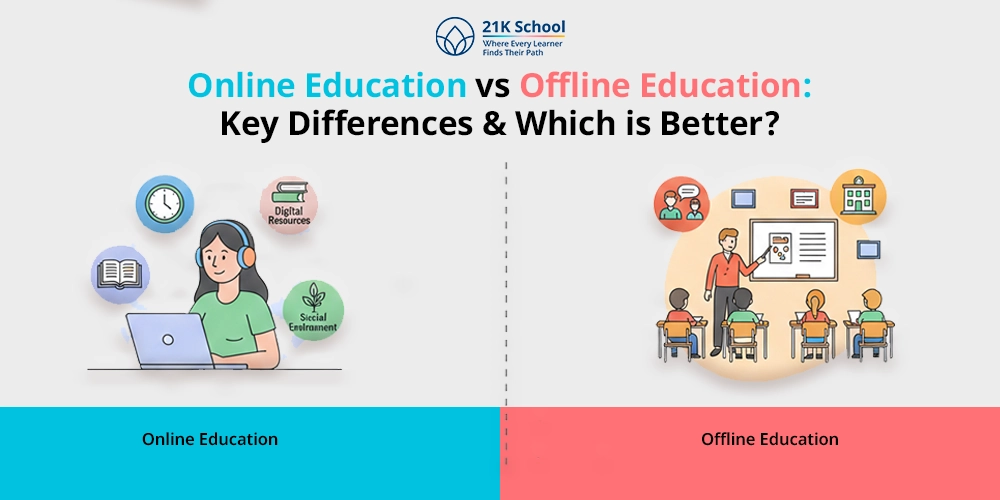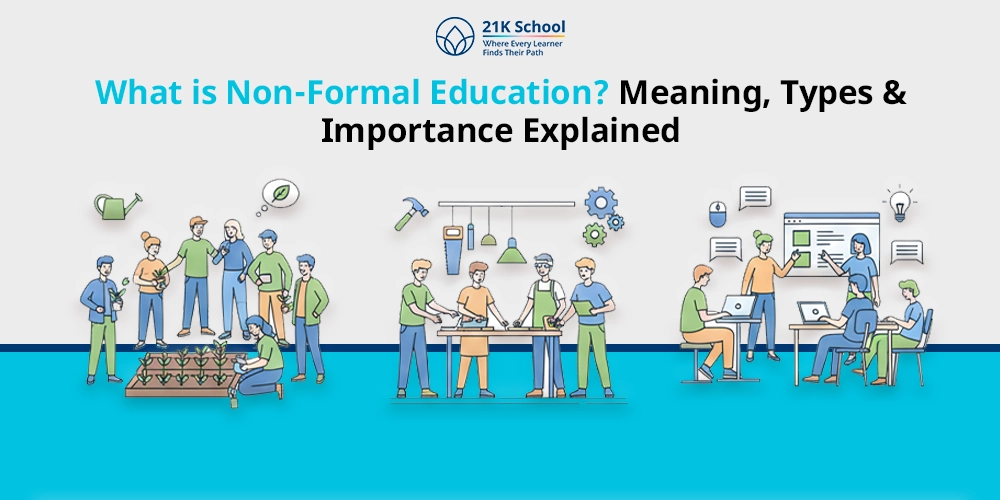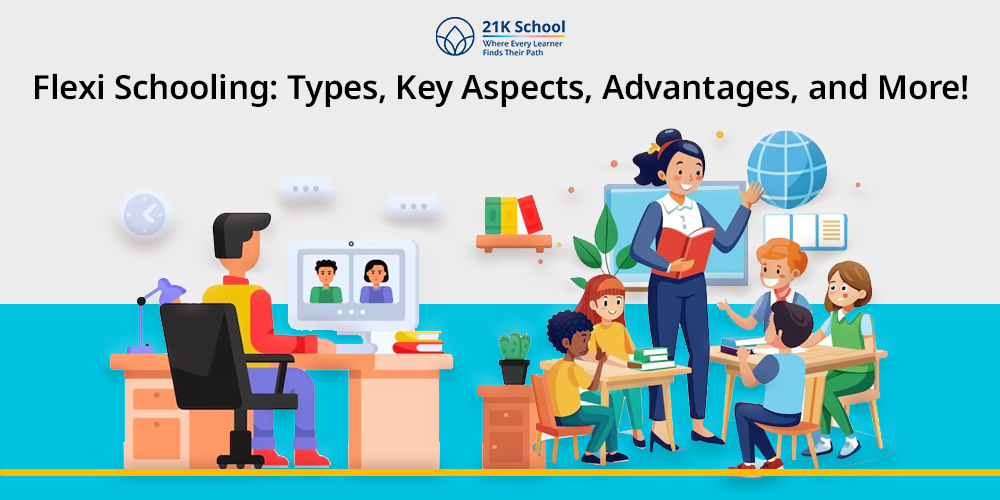
Have you ever thought about why flexi-schooling is becoming popular?
Flexi schooling is a flexible learning approach that allows students to attend the physical classroom along with remote learning .
In this method of learning students attend school part-time and study at home with e-learning platforms .
Flexi schooling allows children to study as per their own comfortability as well as focus on other extra activities. Not every school provides flexi schooling opportunities; however, parents can request for flexi schooling under special provision.
Flexi schoolings are getting popular because of its benefits that enable students to study at their own pace.
Many people consider flexi schooling and homeschooling the same thing, but both are different concepts. However, flexi schooling requires a proper arrangement, which includes parent involvement and proper provisions.
Table of Contents
What is Flexi Schooling?
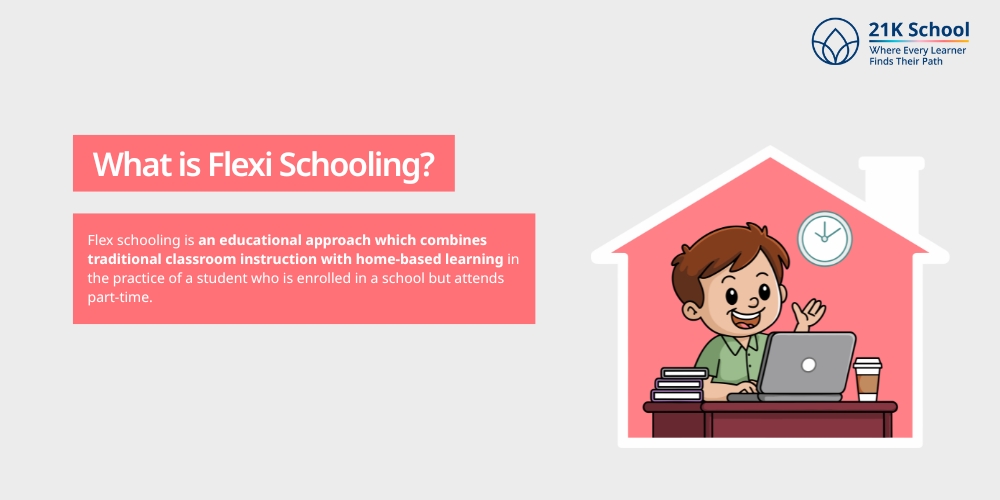
Flex schooling is an educational approach which combines traditional classroom instruction with home-based learning in the practice of a student who is enrolled in a school but attends part-time.
In this method, students attend class part-time and do their assignments and study at home. In this method, many children attend classes on alternative days or split days, in which they attend classes alternatively; otherwise, they study at home.
This method provides flexibility to students, enabling them to complete their education as per their study routine and convenience.
This approach is home-based and thus, parental involvement is required because the individualised approach of home learning is combined with the structure of formal education.
Parents or tutor can help their children with the subjects and course programs. Flexi schooling allows students to indulge in other extracurricular activities such as sports, arts, music, etc.
Is Flexi Schooling Legal in India?
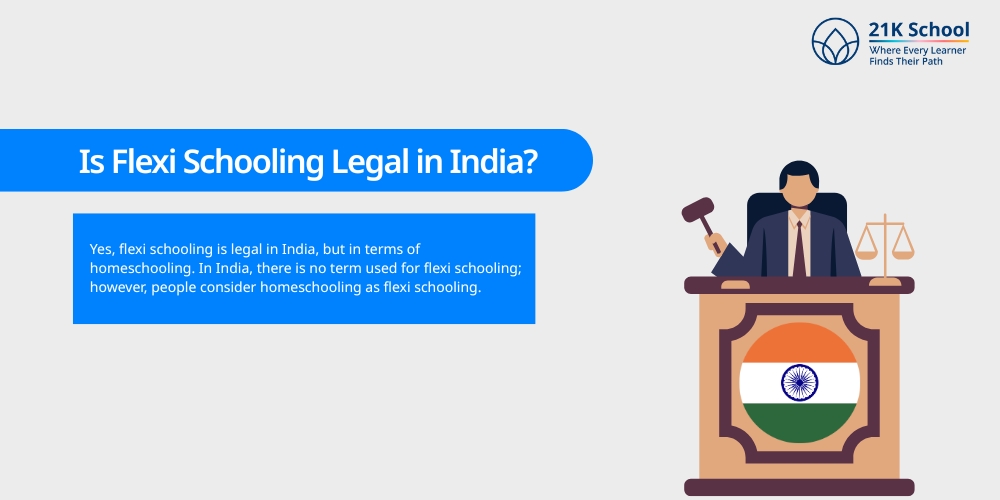
Yes, flexi schooling is legal in India, but in terms of homeschooling. In India, there is no term used for flexi schooling; however, people consider homeschooling as flexi schooling.
In India, various online schools or open schools provide the opportunity of flexi schooling. Mostly, in India National Institute of Open Schooling (NIOS) or the Indira Gandhi National Open University (IGNOU) offers homeschooling as a flexi schooling option.
Even various online schools such as 21K school, DreamsTime school, and Spruha Virtual School also offer flexi schooling in compliance with NIOS.
With the e-learning evolution flexi schooling has become a common method of learning, which allows children to learn at their own pace.
Under the Right to Education (RTE) Act of 2009, children between the ages of 6 and 14 must receive free and compulsory education, though this requirement is not exclusive to conventional school environments.
As a result, parents can educate their kids without any hindrances.
4 Types of Flexi Schooling
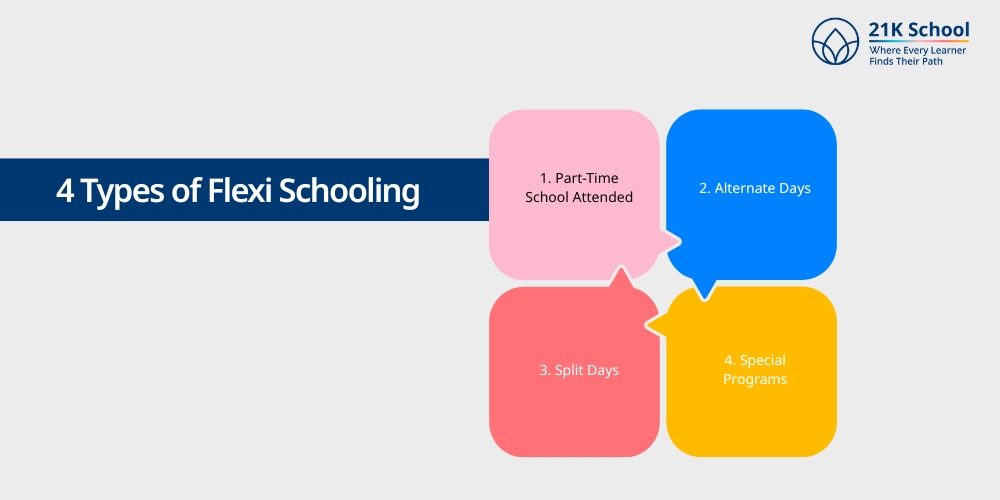
Flexi schooling has several types that denote the hybrid model of education . Flexi schooling enables students to attend classes based on their preferences, through which candidates can attend classes based on alternative or split schedules.
In which candidates don’t have to come to school regularly, instead they can study at their own homes and attend classes on alternative days.
This provides a tailored method of learning that enables students to focus on other activities. The following are the types of flexi schooling.
1. Part-Time School Attended
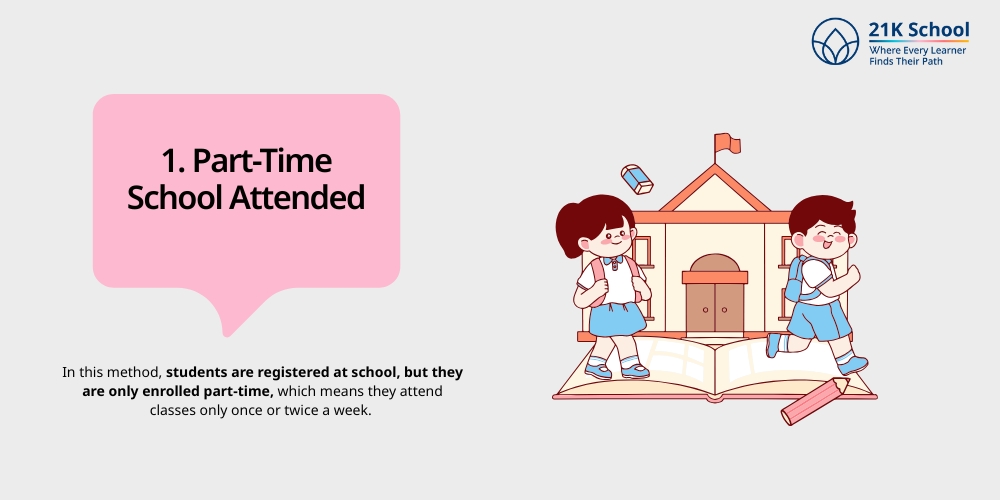
In this method, students are registered at school, but they are only enrolled part-time, which means they attend classes only once or twice a week.
This method is a combination of formal education and personalised learning , which enables them to manage their responsibilities or do other work while studying from tour home.
This method is beneficial for students who need more time or require a less structured model of education.
2. Alternate Days
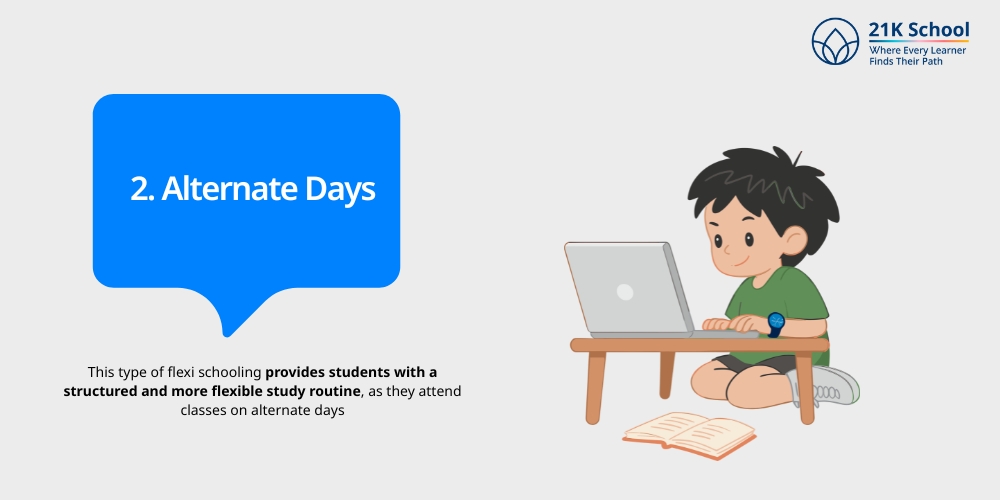
This type of flexi schooling provides students with a structured and more flexible study routine, as they attend classes on alternate days.
This method gives students plenty of time at home to learn, where they can work on projects that interest them or go deeper into subjects.
Additionally, it also reduces their exam stress and study stress that occurs due to full-time classes. This flexible approach allows students to manage their personal and academic lives more effectively.
3. Split Days
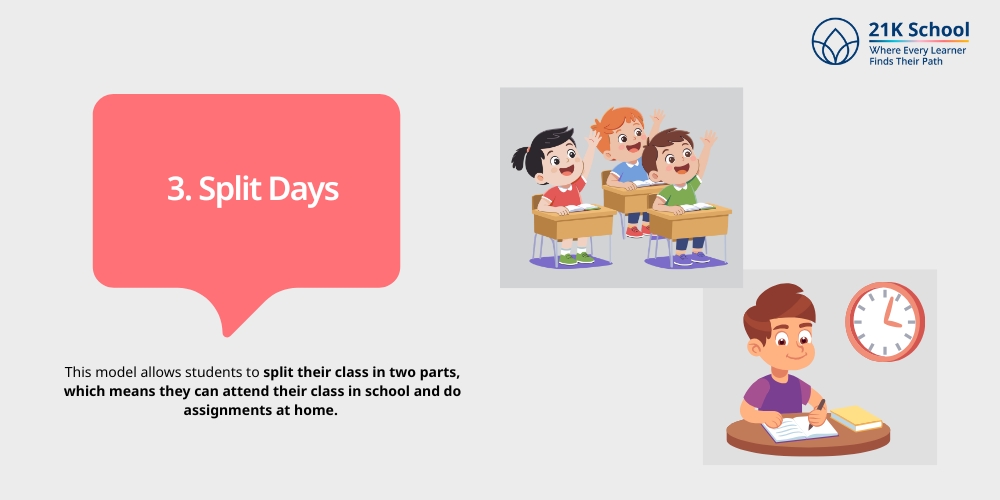
This model allows students to split their class in two parts, which means they can attend their class in school and do assignments at home. It presents a special chance for students to gain from both independent study and in-class education.
By accommodating different learning styles, this flexibility enables students to concentrate on subjects in which they require additional assistance or want to develop deeper connections.
4. Special Programs
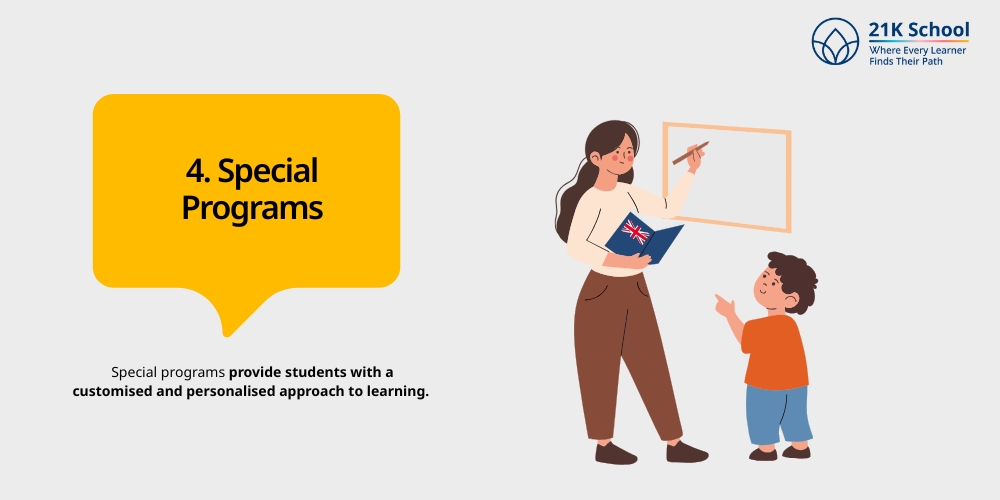
Special programs provide students with a customised and personalised approach to learning. This flex schooling program meets the diverse needs of the learners and provides them with proper support.
In this method, students can request for special preferences through which they can study as per their schedule and convenience. These provisions are provided by some schools, which enable students to actively participate in other activities.
Flexi Schooling Vs Traditional Schooling
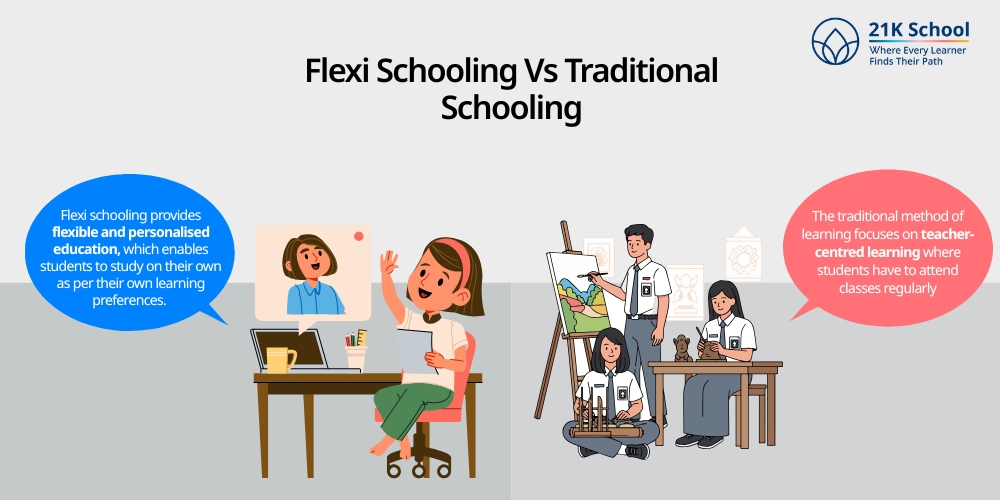
Flexi schooling and traditional schooling are both different aspects of the teaching and learning process. Flexi schooling provides flexible and personalised education, which enables students to study on their own as per their own learning preferences.
This helps in promoting dynamic education and enables students to indulge in lifelong learning . On the other hand, traditional learning has a fixed and structured learning environment.
The traditional method of learning focuses on teacher-centred learning where students have to attend classes regularly. Here is a detailed comparison between flexi schooling and traditional schooling.
| Aspect | Flexi Schooling | Traditional Schooling |
| Flexibility | Flexi schooling is flexible and provides students with autonomy to study as per their convenience. This method allows students to attend classes on alternative days. | Traditional schooling is less flexible and provides a structured learning environment. Due to this structured learning environment students have to attend classes regularly. |
| Interaction | Students attending flexi schooling have to face lack of interaction. As, in this method, student learn by their own and attend school very less, this causes them to develop social isolation. | Traditional schooling allows students to develop their social skills and teamwork through face-to-face interactions with teachers and peers. |
| Affordability | Flexi schooling is affordable as compared to traditional schooling. As it reduces costs associated with transportation, resources and additional fees. | Traditional schooling is expensive as students have to pay additional fees for library, school bus fees, and so on. This makes it less affordable as compared to flexi schooling. |
| Assessment Process | Flexi schooling includes a summative and formative assessment method, which enables students to appear for the examination according to their schedule. This method allows teachers to evaluate students’ performance based on the assessment. | Traditional schooling uses a summative assessment method that includes exams, projects, oral tests etc. Students’ performance is measured based on the marks they have achieved in their examination. |
Advantages of Flexi Schooling
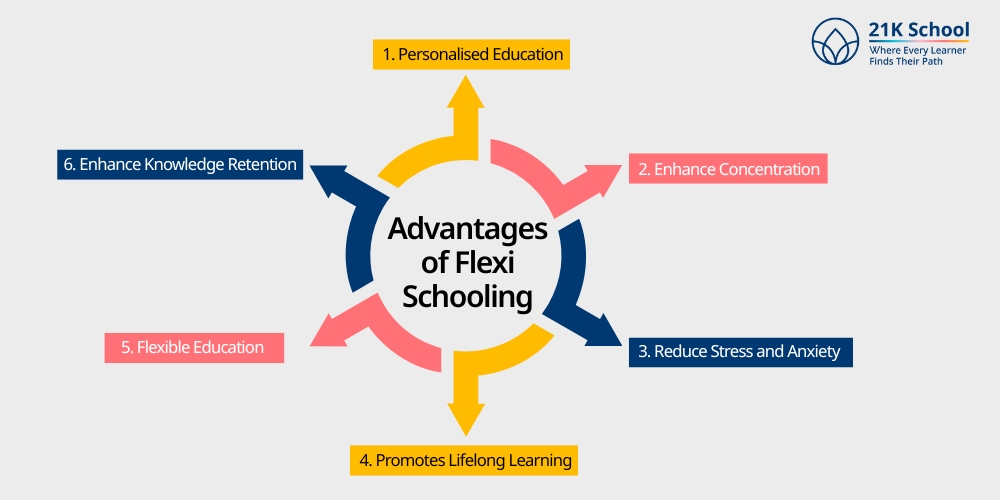
Flexi schooling provides autonomy to students, which enables them to indulge in the learning process as per their convenience.
This flexible approach enhances students’ problem-solving skills and student engagement in academics.
This creative approach allows students to succeed academically as well as develop their mindset and abilities needed to survive in an ever-evolving world. The following are the detailed advantages of flexi schooling
1. Personalised Education
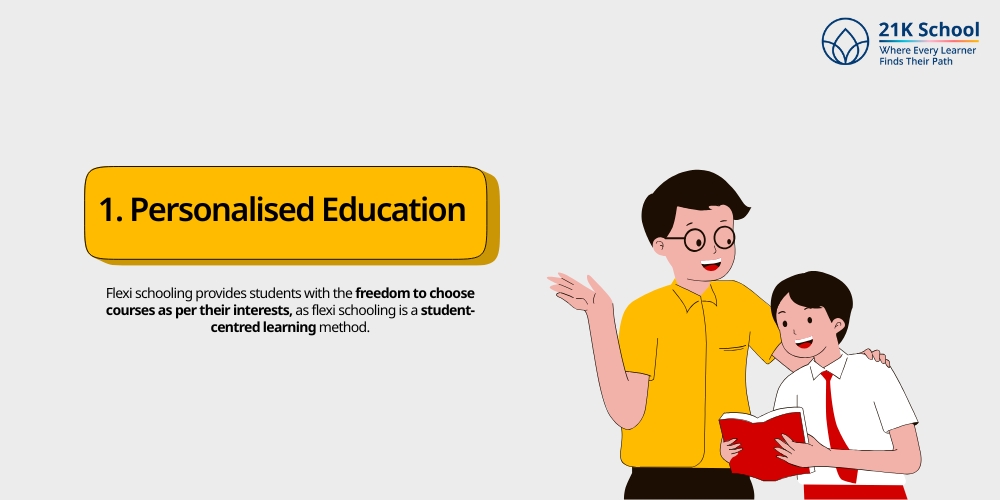
A major benefit of flexi education is the provision of personalised learning that considers each student’s unique needs, interests and learning preferences.
Flexi schooling provides students with the freedom to choose courses as per their interests, as flexi schooling is a student-centred learning method.
Personalisation of education assists students in increasing their motivation and engagement. This allows students to indulge in the learning process more efficiently without hindrances.
2. Enhance Concentration
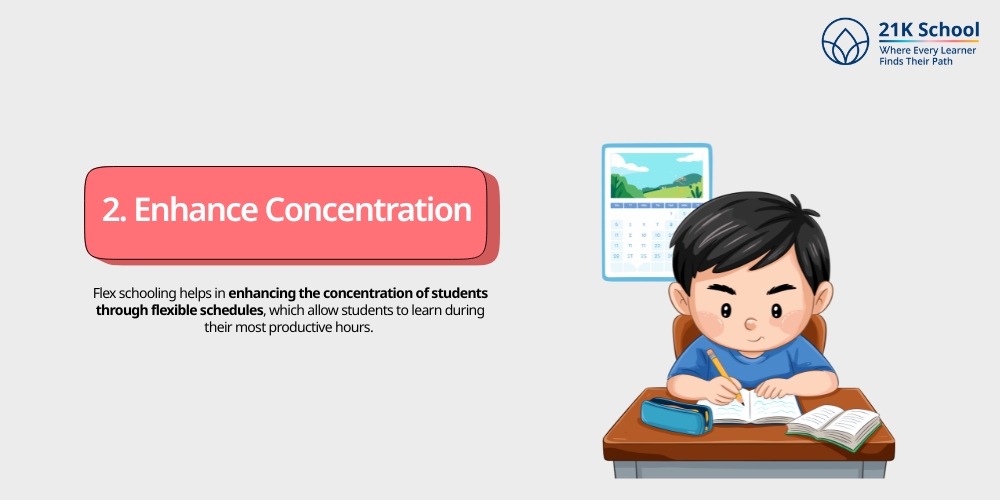
Flex schooling helps in enhancing the concentration of students through flexible schedules, which allow students to learn during their most productive hours.
This flexibility increases focus, since it allows students to schedule their study sessions according to their study schedule and when they feel more productive.
By creating a classroom atmosphere that minimises distractions and promotes concentration, students can achieve better academic results. This method makes education more equitable and allows students to adapt according to their learning style.
3. Reduce Stress and Anxiety
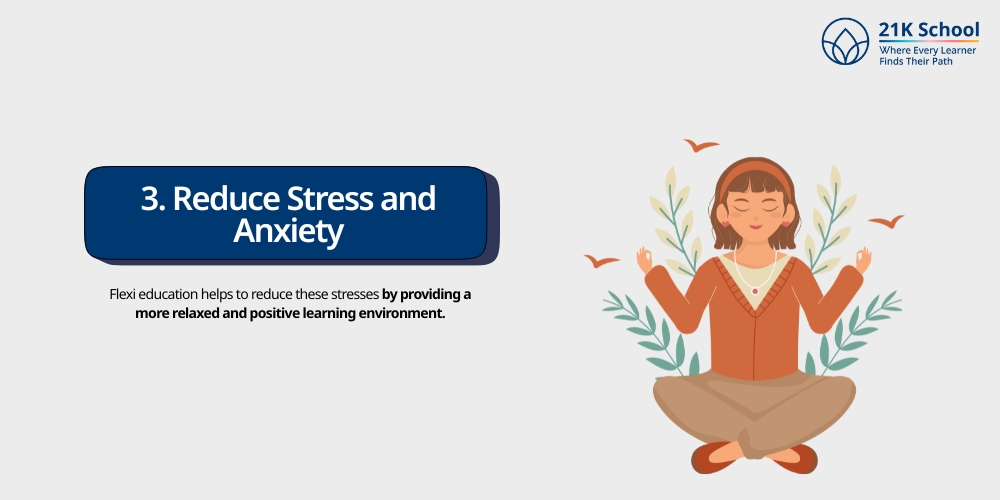
Flexi schooling helps in reducing stress and anxiety among students. Many students find that the structured schedules, frequent examinations and peer pressure cause students to have stress and anxiety.
Flexi education helps to reduce these stresses by providing a more relaxed and positive learning environment. Flexi schooling allows students to manage their time more effectively , which helps in balancing their personal and academic commitments.
This also helps in enhancing and wellness as well as increasing optimism when they approach their studies.
4. Promotes Lifelong Learning
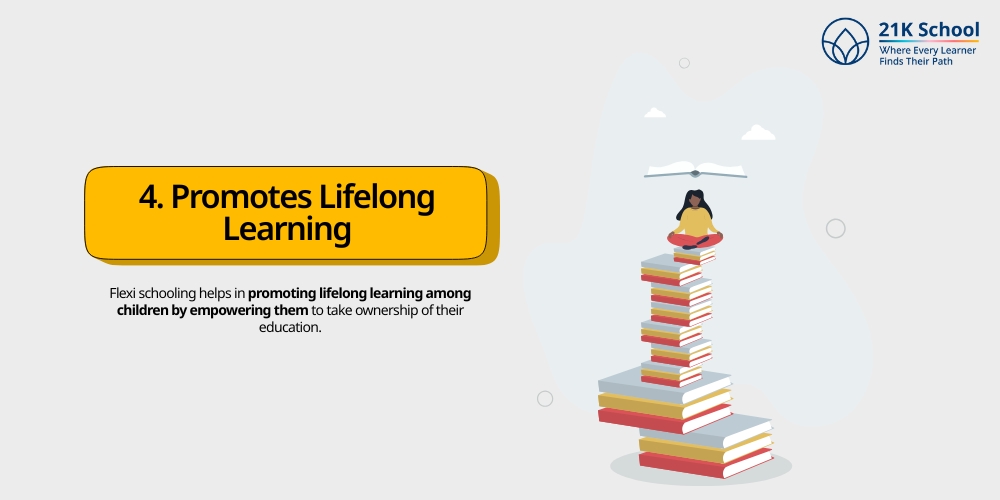
Flexi schooling helps in promoting lifelong learning among children by empowering them to take ownership of their education.
Giving students the opportunity to study subjects that genuinely interest them develops an interest in learning that extends beyond the classroom.
In addition to preparing students for academic success, this approach cultivates a mindset that values continuous growth and development.
This enhances confidence among kids and enables them to see challenges as opportunities instead of hindrances.
5. Flexible Education
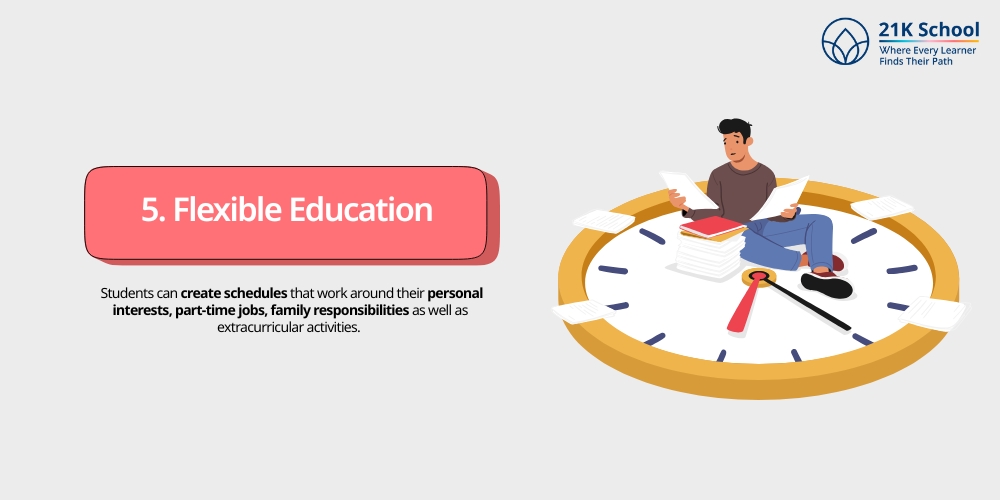
Flexibility is one of the main benefits of flexible learning. Students can create schedules that work around their personal interests, part-time jobs, family responsibilities as well as extracurricular activities.
With the help of flexi learning, students can learn skills outside of the traditional academic subjects.
Additionally, having the option to learn in a variety of contexts, online, in person or through experiential learning , enhances the educational process and equips students for the wide range of demands of the contemporary world.
6. Enhance Knowledge Retention
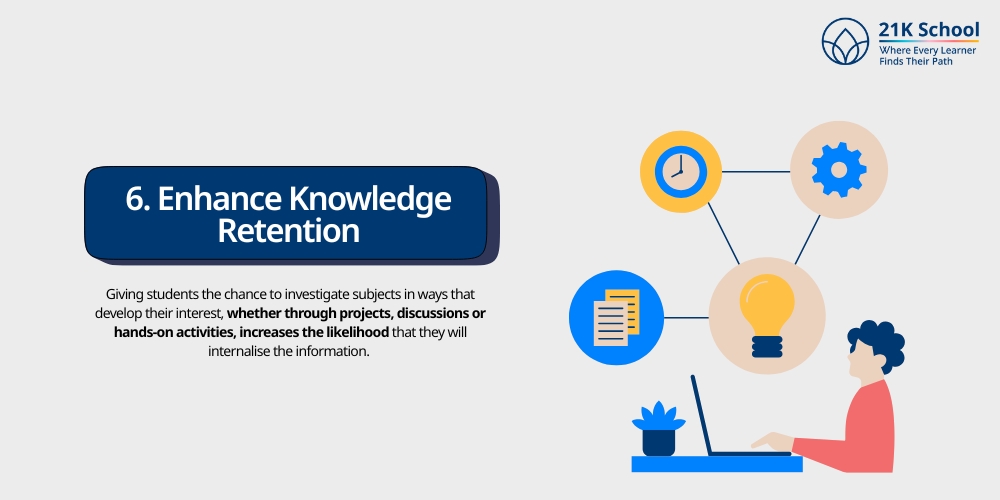
Flextime learning encourages deeper interaction with the material, which could enhance memory retention.
Giving students the chance to investigate subjects in ways that develop their interest, whether through projects, discussions or hands-on activities, increases the likelihood that they will internalise the information.
This active learning strategy results in a deeper understanding of concepts than the rote learning that is commonly employed in traditional settings.
Disadvantages of Flexi Schooling
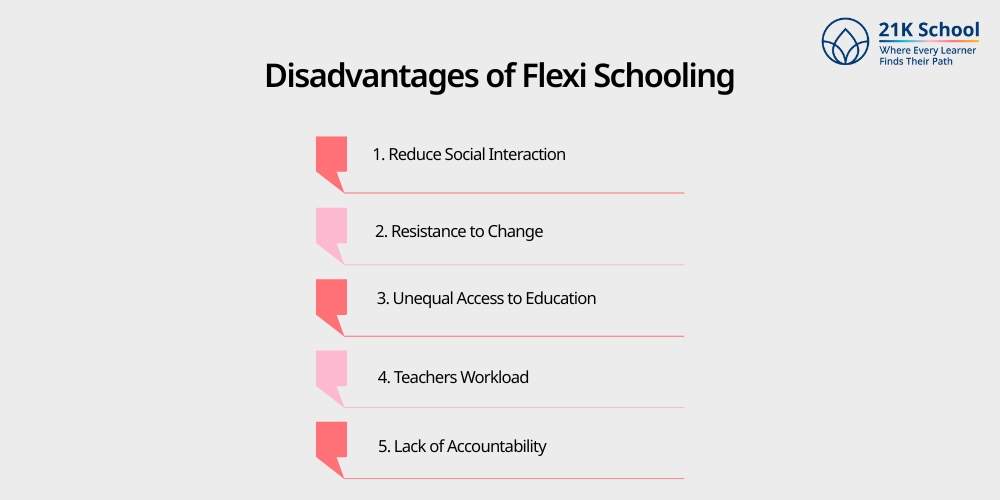
There is no doubt that flexi schooling offers a wide range of flexibility and self-paced learning opportunities.
However, with so many advantages, flexi schooling still has to face so many challenges.
These disadvantages hamper the learning process and make it difficult for students to engage in the teaching and learning process. The following are the disadvantages of flexi schooling.
1. Reduce Social Interaction
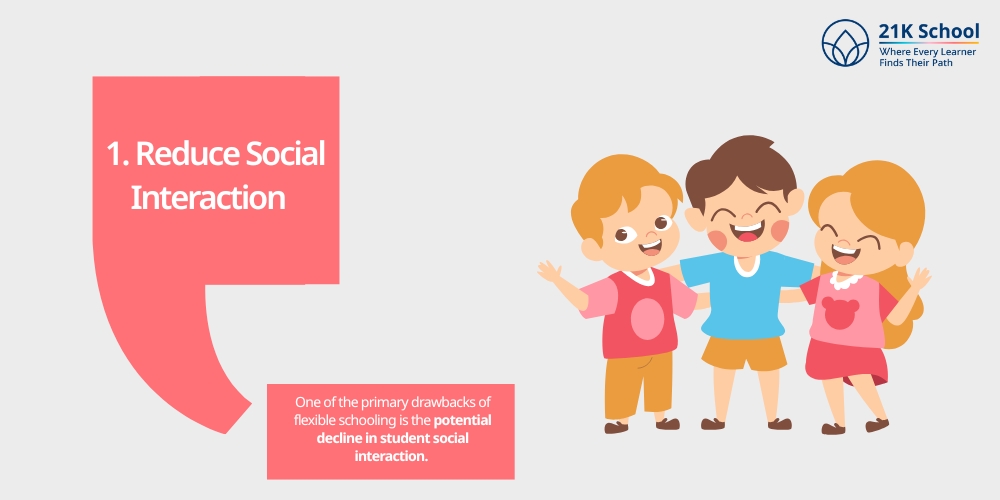
One of the primary drawbacks of flexible schooling is the potential decline in student social interaction.
Traditional school environments foster the development of students’ social skills and friendships through structured learning, peer-to-peer education , sports, group projects and other activities.
Flexi schooling allows students to spend more time studying alone or in smaller groups, which may limit their exposure to a range of social skills.
This also hampers interpersonal skills among students and causes them to develop behavioural problems in schools .
2. Resistance to Change
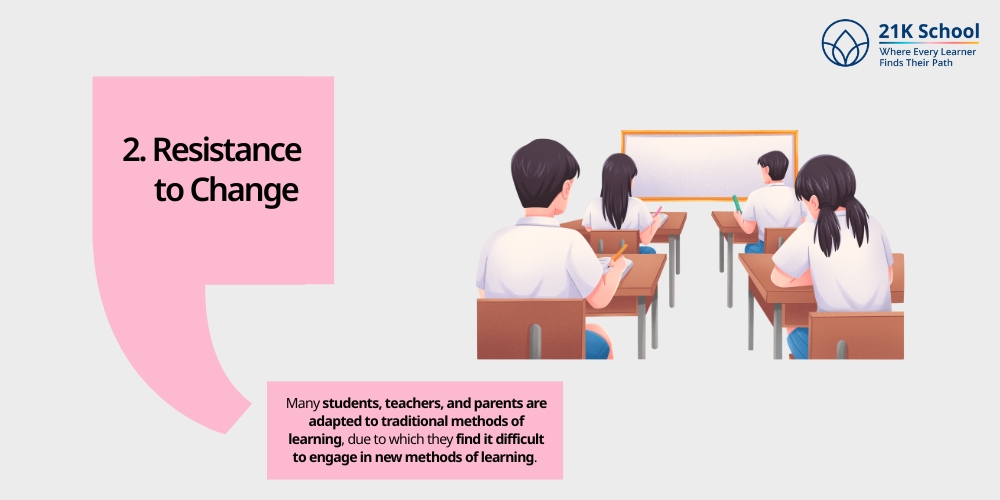
Resistance to change is a major drawback in implementing flexi schooling. Many students, teachers, and parents are adapted to traditional methods of learning, due to which they find it difficult to engage in new methods of learning.
This resistivity hampers the learning process and makes students rigorous. Many students don’t participate in the learning process due to the unknown effectiveness of the learning methods .
3. Unequal Access to Education
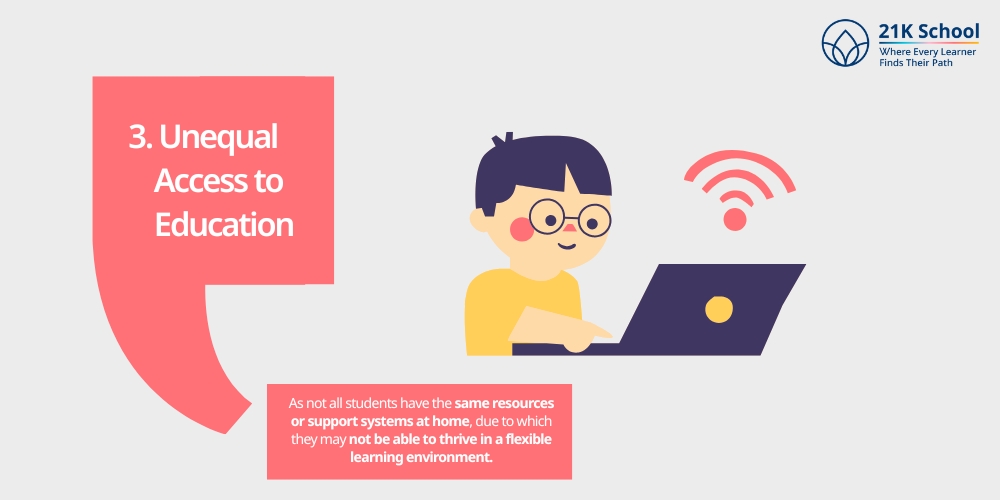
Existing inequalities and uneven access to education hamper the process of flexi schooling. As not all students have the same resources or support systems at home, due to which they may not be able to thrive in a flexible learning environment.
Due to a lack of parental supervision and access to technology-free study spaces students from lower socioeconomic backgrounds may find it challenging to take full advantage of flextime learning opportunities.
4. Teachers Workload
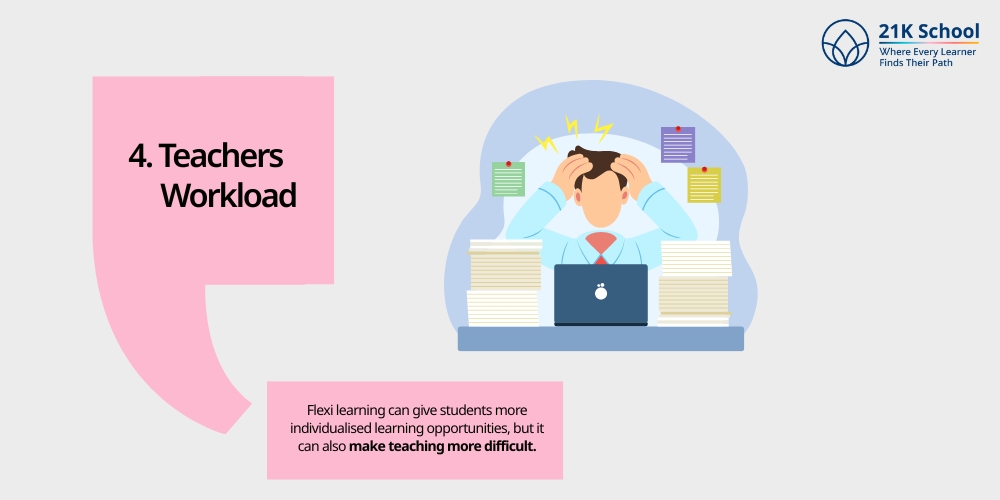
Flexi learning can give students more individualised learning opportunities, but it can also make teaching more difficult.
To meet the varied learning needs of their students, teachers might need to create specialized lesson plans, evaluate their progress more regularly and offer tailored support.
Teachers may become overwhelmed and stressed with their jobs as a result of this increased workload, especially if they are not given the tools or training they need to handle the demands of a flexi schooling model.
5. Lack of Accountability
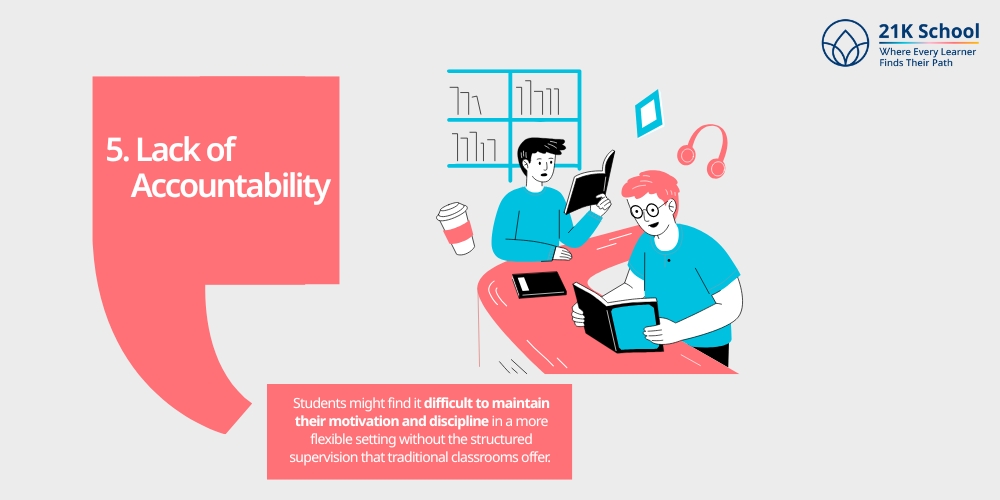
Sometimes, flexi schooling can result in a lack of accountability for both teachers and students.
Students might find it difficult to maintain their motivation and discipline in a more flexible setting without the structured supervision that traditional classrooms offer.
Their academic performance may suffer as a result, and they may become less dedicated to their studies.
Additionally, it may be difficult for teachers as well to properly assess student progress. Sometimes this develops educational Inequalities, and it is difficult to provide every student with equal learning opportunities.
Key Aspects of Flexi Schooling
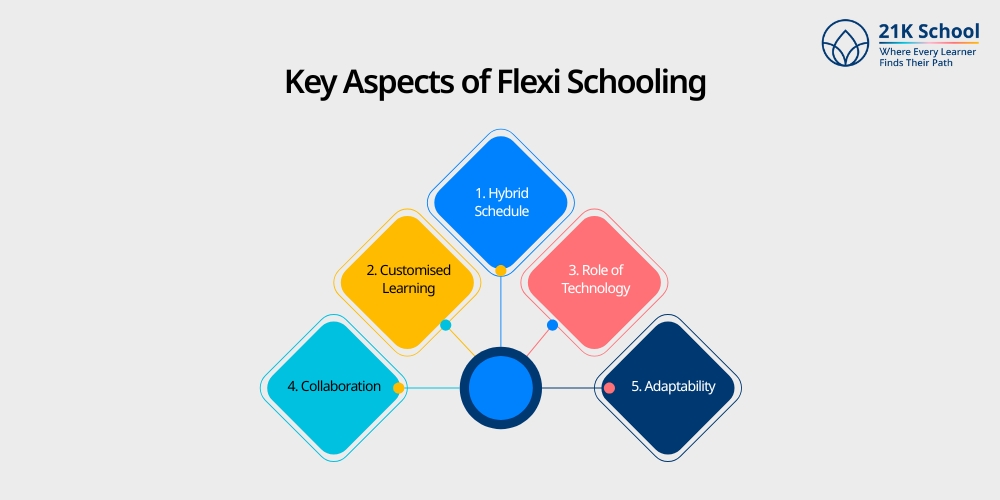
Flexi schooling combines both the aspects of traditional and remote learning, enabling children to study as per their schedule and convenience.
Flexi-schooling is a flexible learning method where students break their study schedule and attend classes as per their convenience.
This method encourages more self-reliance, better time management skills , and a more enthusiastic approach to learning. Here you can refer to the key aspects of flexi-schooling.
1. Hybrid Schedule
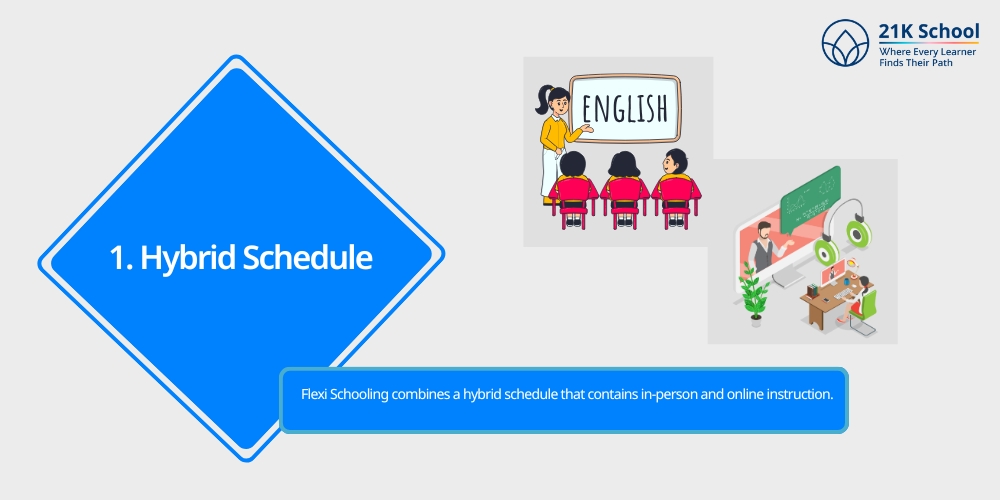
Flexi Schooling combines a hybrid schedule that contains in-person and online instruction. This approach allows students to get both the instructional method.
This method blends the structure and interpersonal interaction of traditional classroom settings with the flexibility of distance learning .
Under a hybrid model, students might attend class for other subjects or activities while completing some coursework online at their own pace.
A hybrid schedule also helps reduce the stress that comes with rigid timetables by letting students study when they are most focused and effective.
2. Customised Learning
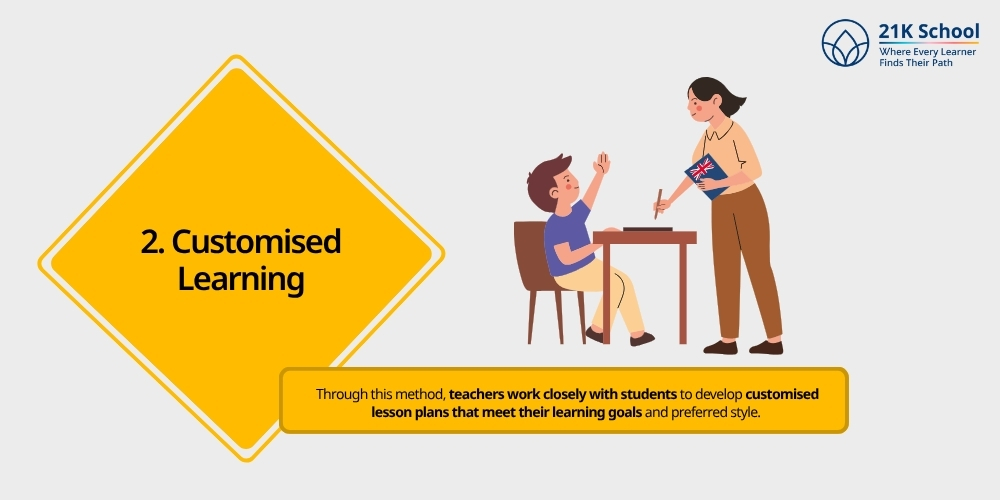
Flexi schooling includes customised learning, which is the most important part of flexible education that signifies the tailored needs of educational experiences to each student.
Through this method, teachers work closely with students to develop customised lesson plans that meet their learning goals and preferred style.
This could mean giving students access to a variety of resources such as project-based learning , independent study or hands-on activities so they can explore subjects in ways that enhance their interest.
Personalized instruction gives students the confidence they need to take control of their education and pursue their interests.
3. Role of Technology
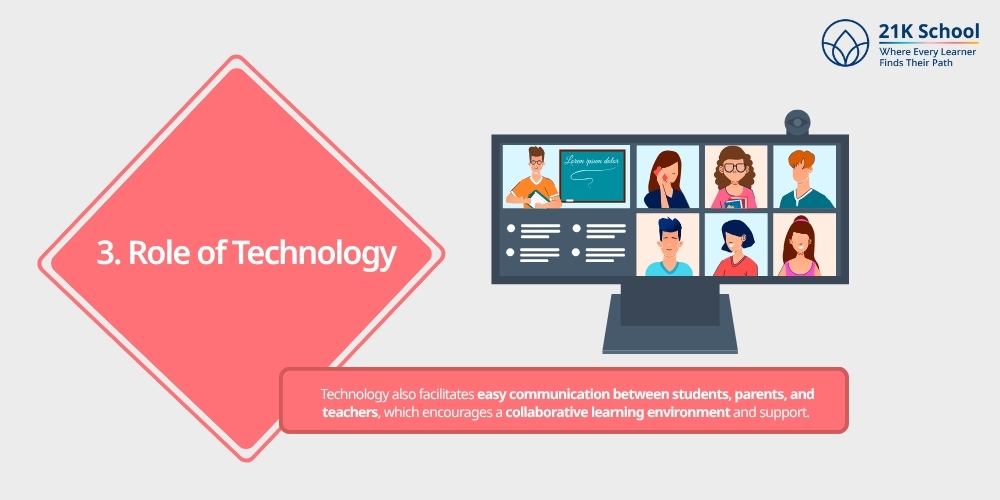
The contribution of technology in education is crucial for the implementation of flexi schooling because it provides the resources and tools needed for effective learning in home-based learning.
With the help of online learning platforms and educational software, students can access a wealth of information and learning materials from anywhere, encouraging self-directed learning.
Technology also facilitates easy communication between students, parents, and teachers, which encourages a collaborative learning environment and support.
By boosting accessibility and engagement, interactive learning technologies like video conferencing and virtual classrooms can enhance education.
4. Collaboration

Flexi schooling helps in enhancing collaboration skills among students, parents, and teachers.
Flex schooling places a strong emphasis on cooperation and communication. Flexible learning allows students to collaborate on projects, exchange ideas and encourage one another’s learning paths.
Along with that, it also helps in improving social skills, which enhances problem-solving skills among students. In order to foster collaboration, educators must provide opportunities for group projects, discussions and peer evaluation to students.
5. Adaptability
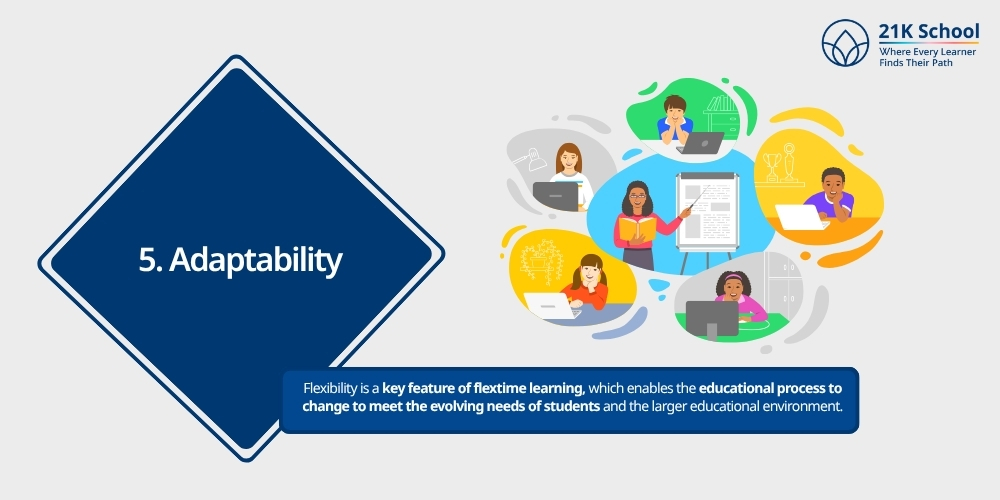
Flexibility is a key feature of flextime learning, which enables the educational process to change to meet the evolving needs of students and the larger educational environment.
Because of this flexibility, teachers can modify their curricula, methods of instruction and strategies for assessment in response to student performance and feedback.
In a world that is changing quickly, students must be able to adapt in order to be ready for new opportunities and challenges.
How Flexi Schooling Works?
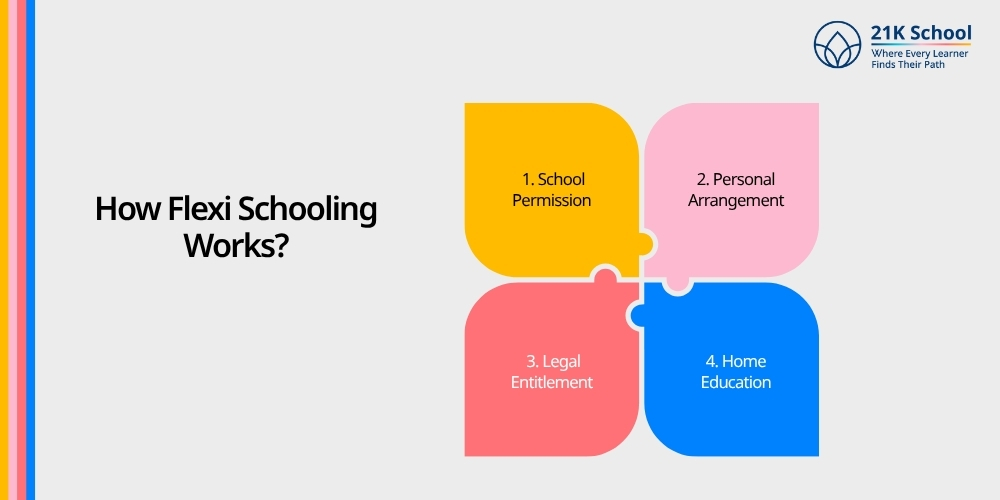
Flexi schooling basically works by providing students with flexible and diverse education. Flexi schooling is not like physical school, instead it is an educational approach that allows students to study at school and home environment.
In this approach students don’t have to attend classes regularly instead they can study at their own pace at home. This approach gives additional time to students to participate in other activities. Here is how flexi schooling works.
1. School Permission
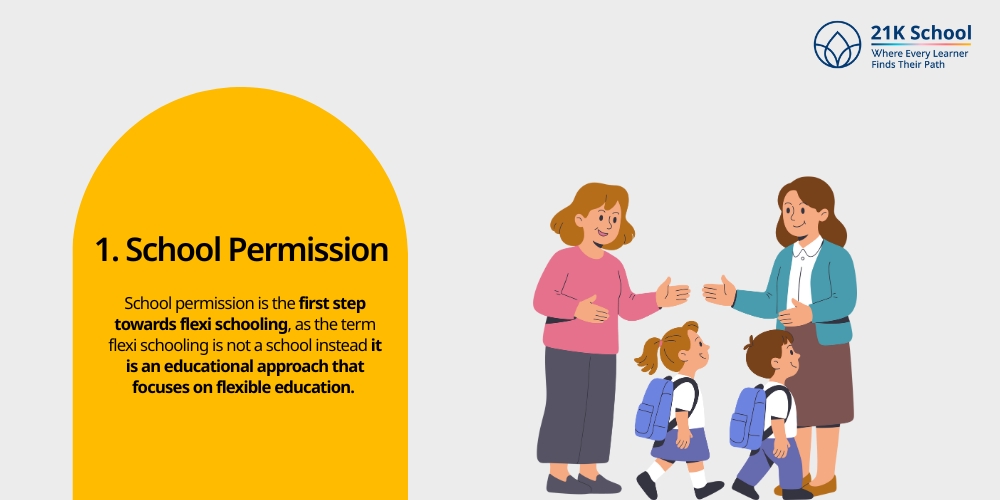
School permission is the first step towards flexi schooling, as the term flexi schooling is not a school instead it is an educational approach that focuses on flexible education.
Parents need to obtain special permission from the school in order to gain flexi school. This process is crucial because it establishes a formal contract between the school and the parents regarding the educational arrangement.
2. Personal Arrangement
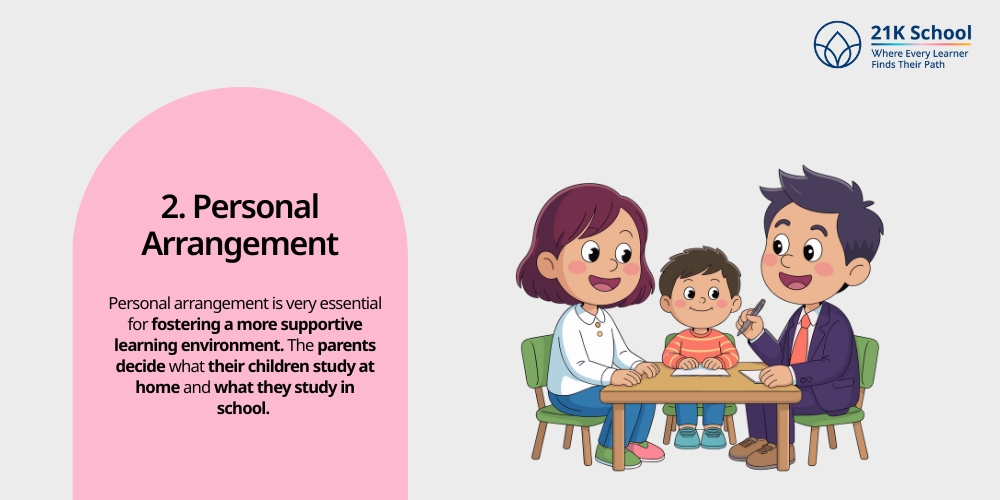
Personal arrangement is very essential for fostering a more supportive learning environment. The parents decide what their children study at home and what they study in school.
This personalization can be especially beneficial for children who have specific learning preferences or challenges. This includes online training programs, computers, proper resources and so on.
3. Legal Entitlement
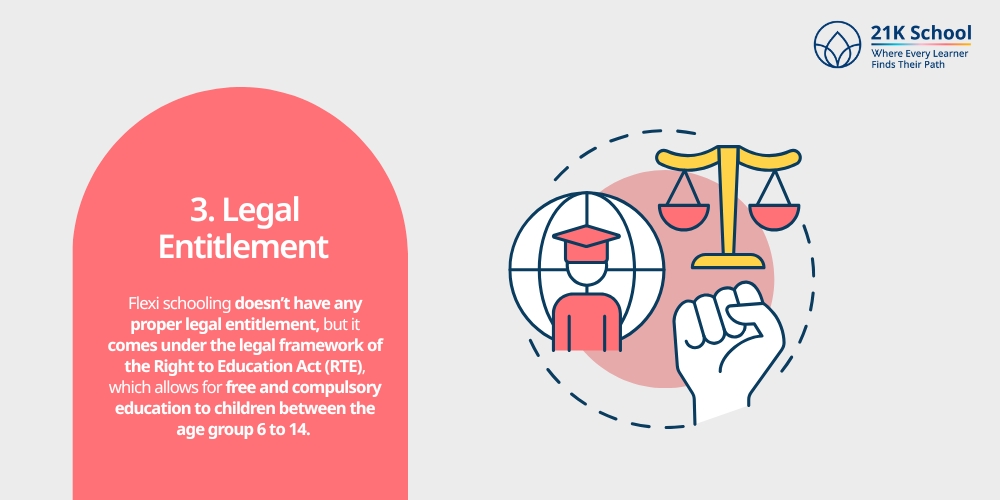
For flexi schooling, it is essential to understand the legal entitlement.
Flexi schooling doesn’t have any proper legal entitlement, but it comes under the legal framework of the Right to Education Act (RTE), which allows for free and compulsory education to children between the age group 6 to 14.
The decision to permit flexible learning ultimately rests with the school’s head teacher, which means that different schools will implement flextime differently.
4. Home Education
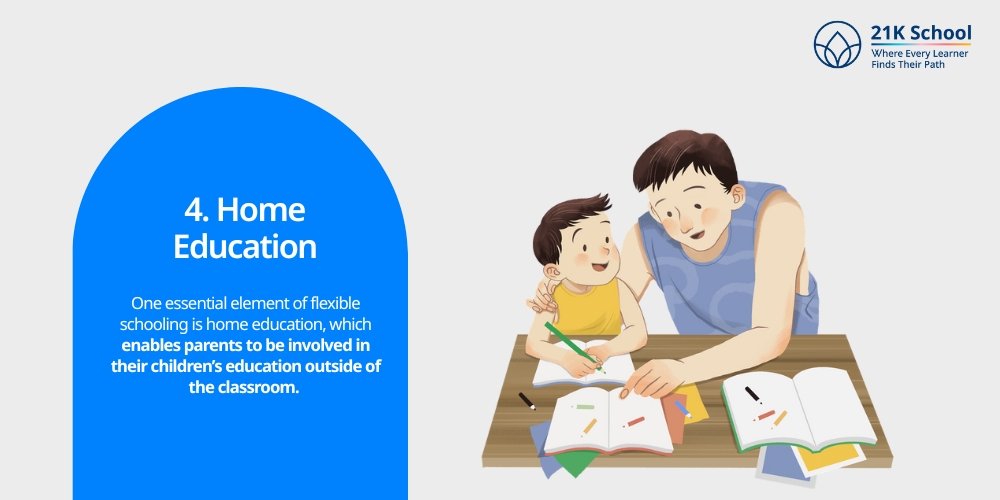
One essential element of flexible schooling is home education, which enables parents to be involved in their children’s education outside of the classroom.
Since flexible scheduling fosters a more welcoming and positive learning environment , it may be especially advantageous for kids with special education needs or medical conditions.
Flexi Schooling Options in India
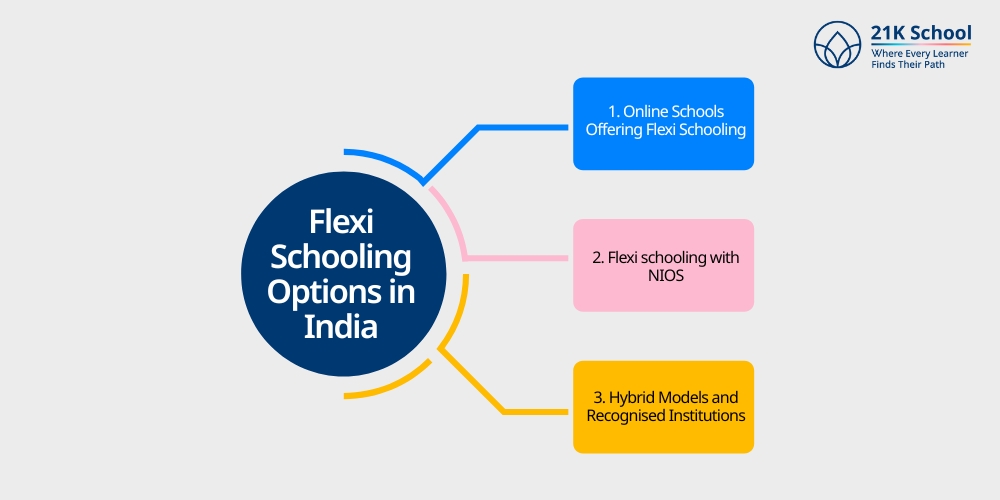
In India, there are more and more options for flexible education, with organisations like NIOS and 21K School setting the standard.
Students have the freedom to customise their education to fit their unique needs and circumstances. With this combination of online learning, open schooling and hybrid models provided by reputable institutions.
1. Online Schools Offering Flexi Schooling
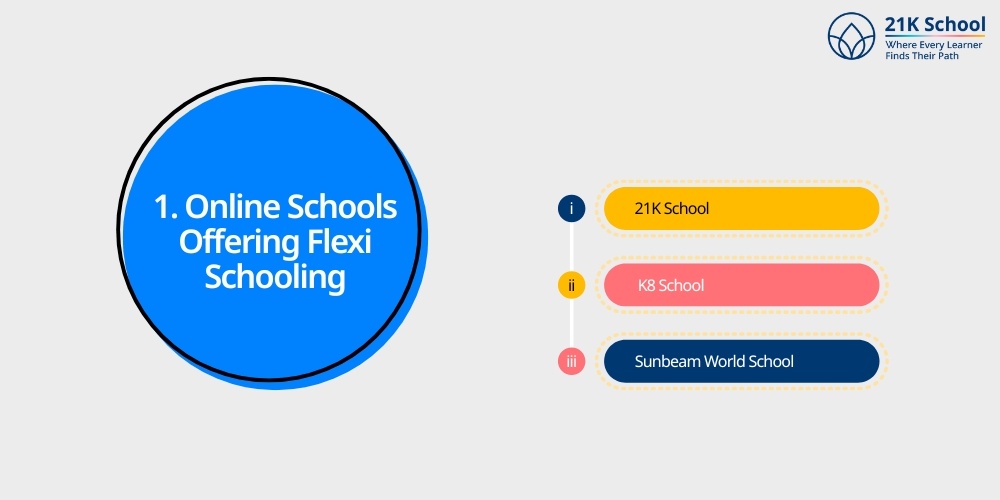
In India, various online schools offer flexible schooling options that align with the needs and learning preferences of their students. Schools such as 21K school, Sunbeam World School, K8 school and so on.
i) 21K School
21K School is an entirely online school that offers a comprehensive curriculum for students in kindergarten through grade 12 with a focus on personalised learning experiences.
21K schools make sure that every student receives quality and equal education with a balanced learning objective. 21K school provides homeschooling opportunities, which enable students to balance their education along with extracurricular activities.
Through a homeschooling environment, students can learn according to their own learning pace and convenience. This allows students to develop ownership of their studies, which allows them to understand the subjects more easily.
ii) K8 School
K8 school is another online school that provides flexible and personalised education to students till class 8. This platform is ideal for students who live in remote areas or travel frequently because they can access it from anywhere.
Students can access a range of subjects and activities at their own pace with the help of an online format which accommodates a variety of learning preferences and styles.
Through K8 School, students can easily learn at their home with the help of e-learning platforms . This allows students to indulge in the learning process as per their comfortability and requirements.
iii) Sunbeam World School
Sunbeam World School is an online school that combines traditional education along with online education . This school provides a flexible curriculum, which allows students to balance their studies along with extra activities.
This method combines personalised learning, which allows students to enhance their engagement and makes education simpler.
Sunbeam World School provides homeschooling opportunities to students, through which students can study as per their own flexibility. This approach focuses on holistic education , making students more active and giving them plenty of time to indulge in other activities.
2. Flexi schooling with NIOS
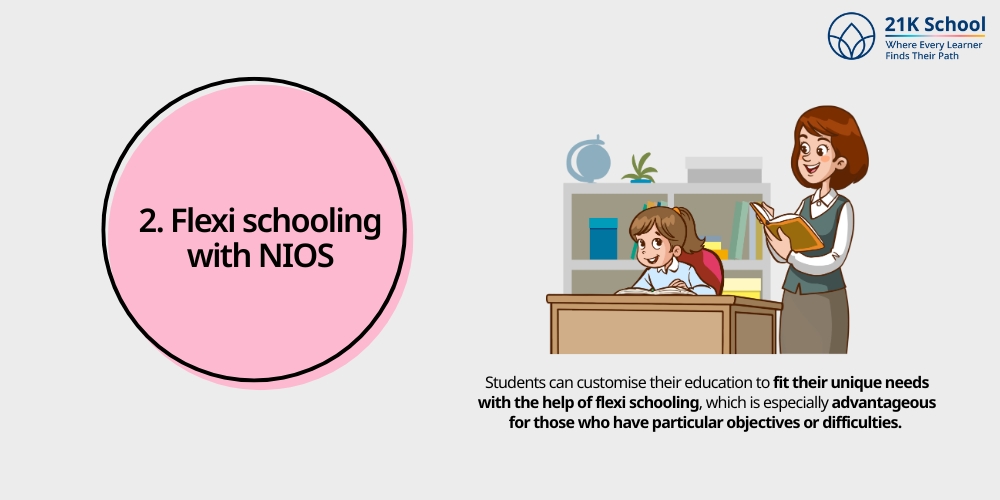
Flex schooling is an educational approach in India offered by the National Institute of Open Schooling (NIOS), which allows students to pursue their education according to their individual needs and circumstances.
One of the main advantages of NIOS is its flexible curriculum, which lets students select courses according to their academic strengths, career goals and areas of interest.
Students can customise their education to fit their unique needs with the help of flexi schooling, which is especially advantageous for those who have particular objectives or difficulties.
The open schooling system of NIOS provides a flexible educational approach that enables students to appear for the examination whenever they want or according to their convenience.
3. Hybrid Models and Recognised Institutions
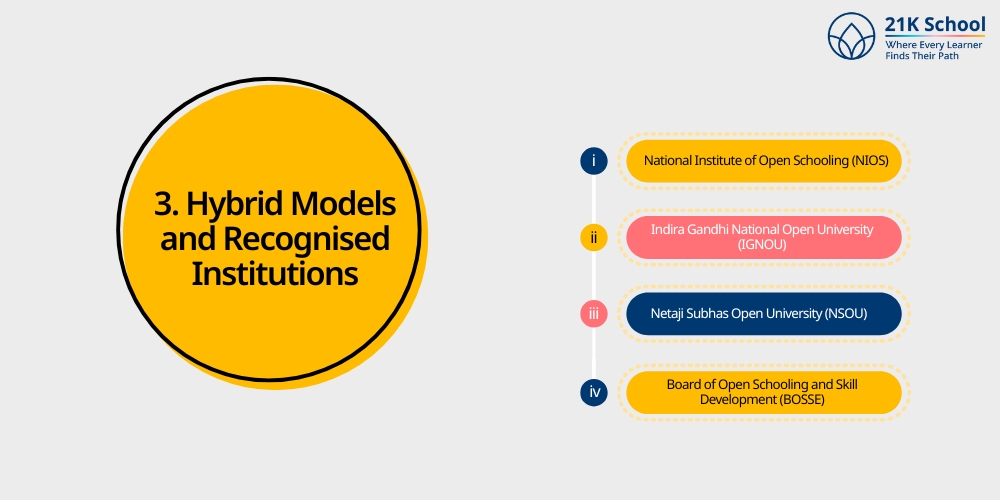
Various recognised educational institutions provide hybrid and open learning initiatives. Various educational institutions, government and private, offer a flexible approach of education in terms of homeschooling, which denotes to flexi schooling.
This hybrid model allows students to study as per their comfort level and determination. With this flexibility, students can focus on other activities as well.
i) National Institute of Open Schooling (NIOS)
National Institute of Open Schooling (NIOS) is a flexible learning approach that enables students to study as per their own comfortability and convenience.
NIOS offers open education, which allows students to study as per their convenience and appear for the examination whenever they want. NIOS provides multiple subjects and course programs, which allow students to choose the program according to their interests.
This method of learning enables students to study on their own, which develops lifelong learning among them.
The open schooling system of NIOS enables students to be enrolled in the academy whenever they want, throughout the year. This flexibility helps students to focus on other activities along with their academics.
ii) Indira Gandhi National Open University (IGNOU)
Indira Gandhi National Open University (IGNOU) is an open university for higher education. IGNOU is the largest open university in the world that provides affordable, flexible and personalised education.
IGNOU offers open and distance learning as a mode of flexi learning. This approach allows students to study from their home and attend the examination as per their convenience.
This approach allows students to develop confidence and attention, which is essential for self paced learning. IGNOU is known for providing a wide range of programs including language and vocational subjects.
The vast number of subjects allows students to choose as per their interest and career goal. The flexible model breaks the barriers of discrimination and racial problems in schools and enables students to study without any hindrances.
iii) Netaji Subhas Open University (NSOU)
Netaji Subhas Open University (NSOU) is a state open university that allows students to indulge in the learning process in distance mode. NSOU offers distance education as a part of flexi education, which offers them flexible learning opportunities.
This opportunity makes education more impactful and easier for students to gain knowledge without any barriers.
This open university provides undergraduate and postgraduate courses to students, with the flexibility to choose any subjects or curriculum based on their interests.
NSOU provides a flexible approach where students don’t have to attend classes regularly, and they can appear for the examination whenever they want. This flexibility allows students to focus on other activities along with their academics.
iv) Board of Open Schooling and Skill Development (BOSSE)
Board of Open Schooling and Skill Development (BOSSE) is an open education program that allows students to study as per their convenience. BOSSE focuses on skill development programs through vocational education .
BOSSE provides flexible and personalised education, enabling students to appear for secondary or senior secondary examinations.
This open school provides flexi schooling opportunity that allows students to study as per their convenience and schedule.
Along with academics, BOSSE also focuses on skill development programs, which allows students to enhance their career opportunities in multiple fields.
Students who are dropouts, failed students or have missed the examination can apply for the BOSSE program. This gives them distance education in the various fields to ensure that every student has equal learning opportunities.
Final Thought
Flexi schooling is a flexible educational strategy that blends home-based learning with conventional classroom instruction.
Because of its advantages, which include individualised instruction, improved focus, decreased stress and the encouragement of lifelong learning, flexible schooling is becoming more and more popular.
The National Institute of Open Schooling (NIOS) and other online schools that provide flexible education suited to students’ needs are among the options for flextime learning in India.
All things considered, even though flexible learning has many benefits, there are also serious issues that must be resolved for it to be implemented successfully.


